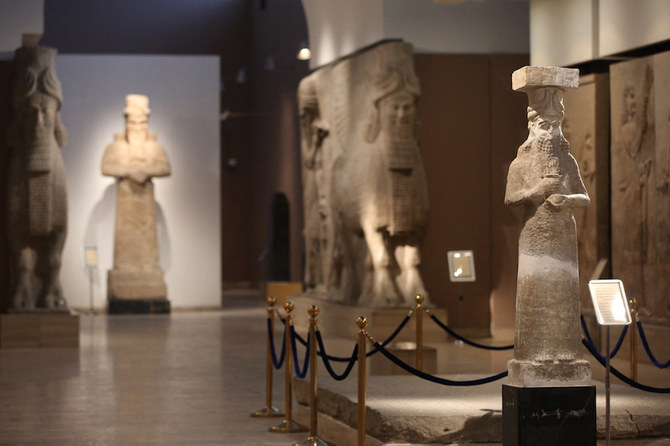MOSUL/BOGOTA: On Feb. 26, 2015, shocking footage emerged from northwestern Iraq of Daesh militants smashing pre-Islamic artifacts and burning ancient manuscripts at Mosul Cultural Museum.
The terrorist group, which had seized control of the multiethnic city the previous year, had set about looting everything of value and destroying anything that failed to conform to its warped ideology.
The priceless objects had told the singular narrative of Iraq as a land of remarkable civilizations, from the Sumerians and the Akkadians to the Assyrians and the Babylonians. Yet it took only moments for Daesh to erase the evidence of thousands of years of human history.
The same was true across large swaths of the country seized by the militants intent on symbolic destruction and easy loot.
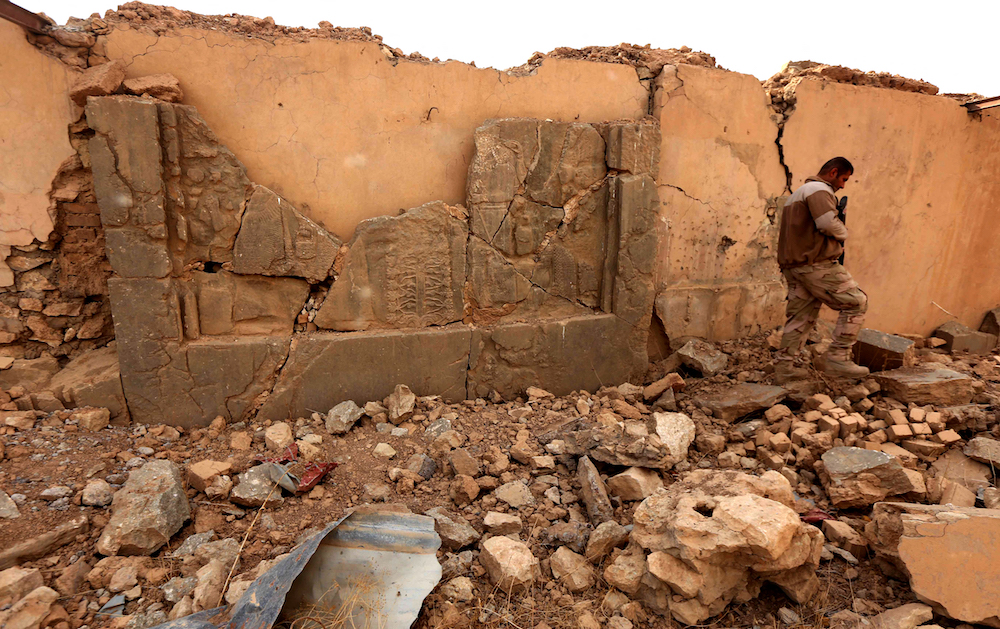
An Iraqi army soldier walks across the ancient ruins of Nimrud following the recapture of the ancient town on the outskirts of Mosul from Daesh extremists. (AFP/File Photo)
“Daesh wanted to show and prove that it could not only destroy the present and future of Iraq but its past as well,” Amer Abdul-Razzaq, head of the Directorate of Antiquities and Heritage in Iraq’s southern Dhi Qar province, told Arab News.
“They wanted to destroy the mixed civilization of Iraq, which is diverse with different ethnicities, minorities and nations such as the Akkadians, Assyrians and Babylonians. They brutally destroyed places like Nimrud, Hatra, the tomb of the Prophet Yunus, and they destroyed many places that are holy and symbolic to Muslims.”
On July 21, 2017, almost two years after the pillaging, Mosul was finally liberated by the Iraqi army, ushering in a period of painstaking work to restore the city’s monuments, churches, mosques and archaeological treasures.
Since then, and the subsequent liberation of other areas that were under the group’s control, Iraq has experienced something of an archaeological renaissance, with foreign experts returning to the country and a growing number of young Iraqis taking an interest in preserving what remains of their heritage.
“Antiquities and heritage unite us and let us recognize we all belong to each other, and it is important for us to know we all go back to one root in some point in ancient history,” Falih Al-Shmari, who is studying for a doctorate at the University of Baghdad, told Arab News.
“For example, Assyrian mandates were found in the north, east, west and south of Iraq, which indicates we all were Assyrian at some point and we belong to others as one identity.
“Even in Islamic history, we were the same and there is the same description of Islamic architecture and ideas. We are an Islamic society and we were all educated in Islamic principles and education in the past.”
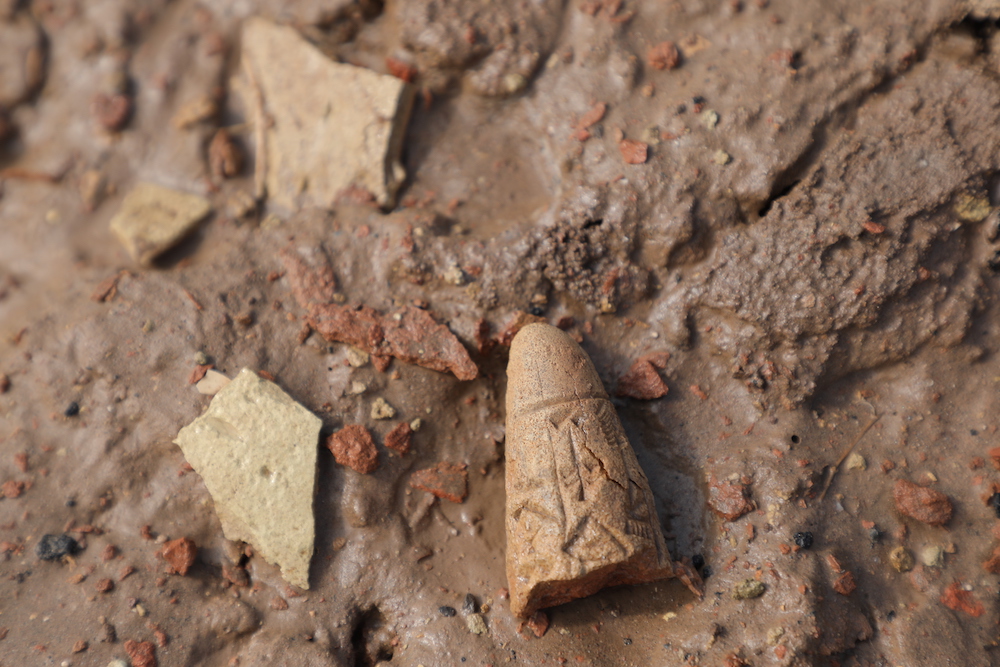
Numerous sculptures, pottery and cuneiform artifacts, which are estimated to date back to 3,000 BC, are unearthed by British Museum archaeologists in what was once the ancient city of Girsu, capital of the Kingdom of Lagash, now in Dhi Qar, Iraq. (AFP/File Photo)
Among the most recent discoveries is a mosque built from mud dating back to the Umayyad period, about 1,400 years ago, uncovered by British Museum specialists in tandem with local experts at Tell Kabiba in Dhi Qar.
Prior to this, in 2016, an archaeological team led by Sebastien Rey of the British Museum, discovered the Enino temple — also known as the Temple of the White Thunderbird — in the Assyrian city of Girsu, now known as Tello, in the north of Dhi Qar.
Other European-led missions working in Tello have uncovered the temple of King Gudea, the most famous Sumerian king of the Lagash dynasty, who ruled between 2144 B.C. and 2124 B.C.
In the past year, French archaeologists working in the city of Larsa at Tell Es-Senkereh discovered the palace of King Sin Ednam (1850-1844 B.C.), which dates back to the ancient Babylonian era.
Six missions from Britain, France and Italy working in the Sumerian city of Girsu have uncovered a residential area dating back to the Early Dynastic period (2900–2350 B.C.), including the temple of the god of war Ningirsu.
Another major achievement is the restoration of what is perhaps the oldest bridge in the world, in the city of Girsu. The work on the 4,000-year-old structure is taking place under a five-year contract with a British team.
British and German excavation teams have also uncovered the site of the ancient city of Charax Spasinou, the largest city built by Alexander the Great, in southern Iraq near Basra at the modern-day site of Jebel Khayaber.
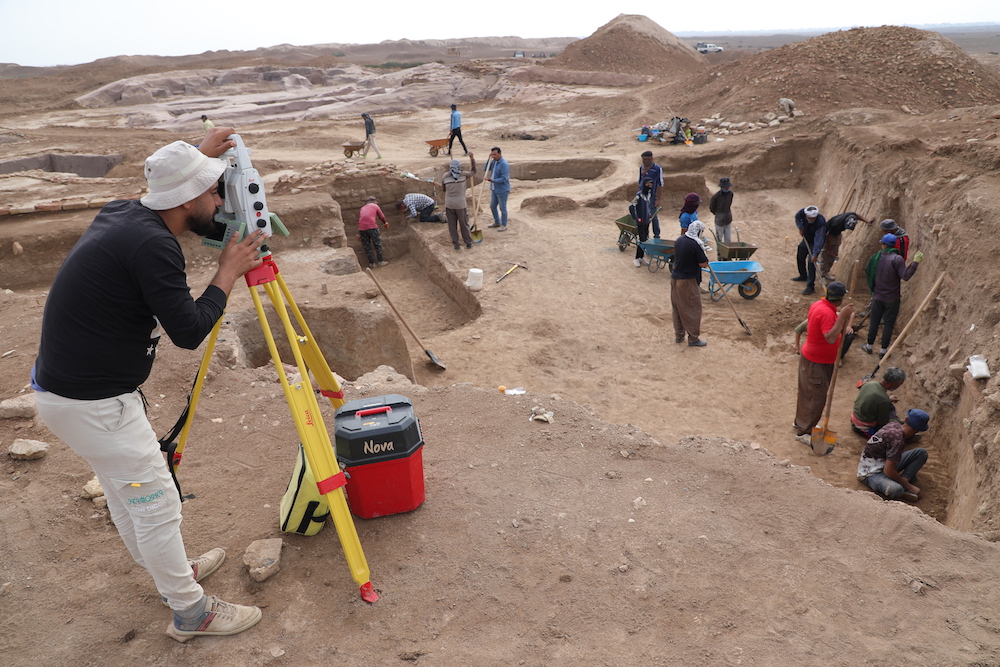
Among the most recent discoveries is a mosque built from mud dating back to the Umayyad period, about 1,400 years ago, uncovered by British Museum specialists in tandem with local experts. (AFP/File Photo)
Meanwhile, in the north of the country a French team in Mosul is continuing its maintenance of the mural of the Church of Mar Korkis, and working at sites in the city of Ashur, which include the royal cemetery, the Parthian palace, and Walter Andre’s palace.
At the Kirkuk Citadel, also in northern Iraq, the local archaeological authority is working with the Turkish government to properly maintain what some scholars believe is the tomb of the Prophet Daniel.
“We have found empires and states that are unbelievable and we, in this era, can barely imagine how powerful and advanced they were,” said Abdul-Razzaq.
“Iraq lies upon a massive archaeological trove of more than 20,000 sites. It is very hard to protect it all. That is why a lot of it has been stolen and destroyed. The items that have been stolen are in the thousands.
“In my opinion, I see it as a human tragedy because this archaeology is not only that of a specific nation or minority, but all of humanity.”
The looting and destruction did not begin in 2014 with the rise of Daesh, however. Abdul-Razzaq said Iraq’s heritage has been suffering as a result of conflict and official neglect for decades.
“In 2003, during the US invasion of Iraq, there was massive destruction at many archaeological sites and that was due to a lack of protection by the UN,” he said. “American forces protected oil fields, important ministries, defenses and security — not archaeology.”
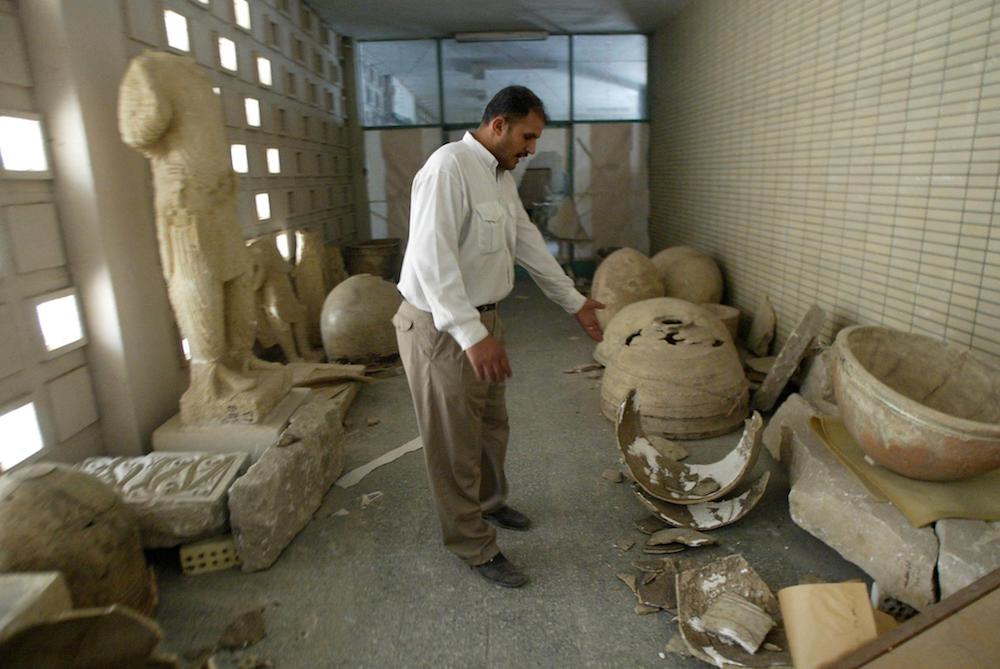
An Iraqi guard shows broken jars in the ransacked and looted Iraq’s largest archeological museum in Baghdad in 2003. (AFP/File Photo)
The looting of Baghdad Museum was perhaps the most emblematic example of this neglect. For 36 hours, beginning on April 10, 2003, the museum was ransacked by thieves.
It was only later, when the extent of the damage became clear, that the US-led coalition began to prioritize the protection of Iraq’s antiquities.
“Six months after the US invasion, the Americans realized they had to act in order to protect archaeological sites from looting and destruction,” said Abdul-Razzaq.
“Through social activists, and after (Grand Ayatollah) Ali Al-Sistani issued a fatwa, they raised awareness among the people about protecting it. After that, the Iraqis were able to bring back many stolen archaeological items and people started protecting it.
“Nevertheless, we have lost, and are still missing, a massive number of items, even today. We are still searching for them.”
Aamir Al-Jumaili, a lecturer at the University of Mosul’s College of Archaeology for 20 years, said the destruction of Iraqi heritage has been going on even longer.
“We need to go back to 1991, not only 2003, to evaluate the destruction and loss we had,” he told Arab News. “During Iraq’s invasion of Kuwait in 1991, Iraq lost many archaeological items through robbery, destruction and smuggling at museums in Iraq’s cities.”
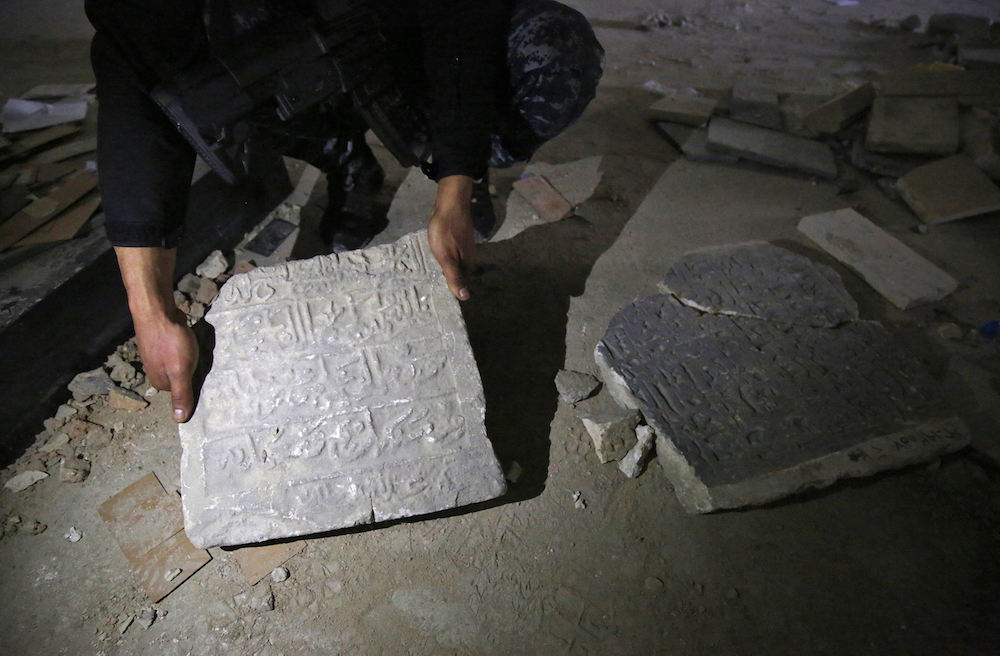
A member of the Iraqi forces holds damaged artefacts inside the destroyed museum of Mosul in March, 2017 after they recaptured it from Daesh fighters. (AFP/File Photo)
Although authorities in the country have introduced legislation to protect antiquities, based on earlier laws first enacted in 1936 and strengthened in the 1970s, some experts believe the government should make the penalties for harming the nation’s heritage much more robust.
“In the past, the laws protecting archaeological sites and ancient history were stronger than we had in 2003 and 2014,” Ahmad Qasim Juma, an archaeology lecturer at the University of Mosul and a UNESCO consultant, told Arab News.
“Before 2003, if anyone did anything illegal to an ancient archaeological site, they would be killed by the government. After 2003, and until 2018, anyone would go to an archaeological site and start digging and researching without expert knowledge or a government permit. There are no strict punishments to stop them.”
The problem has been compounded by decades of government neglect and underfunding, dysfunctional administrations, and the continued presence of armed groups in the countryside, including militias backed by Iran.
“There are many different forces and militias controlling the country,” said Al-Shmari. “Sinjar contains foreign forces and militias that control it all. If you want to research or investigate, they don’t allow you to do it. Sinjar is one of the areas that is very hard to get to for archaeologists.”
He believes that investment by the central government could help turn the tide and, in the process, begin to reshape Iraq’s global image.
“We are not happy with the level of government support for Iraq’s antiquities and heritage. It is really low. If it was up to me, I would make Mosul one of the biggest tourist cities,” said Al-Shmari.
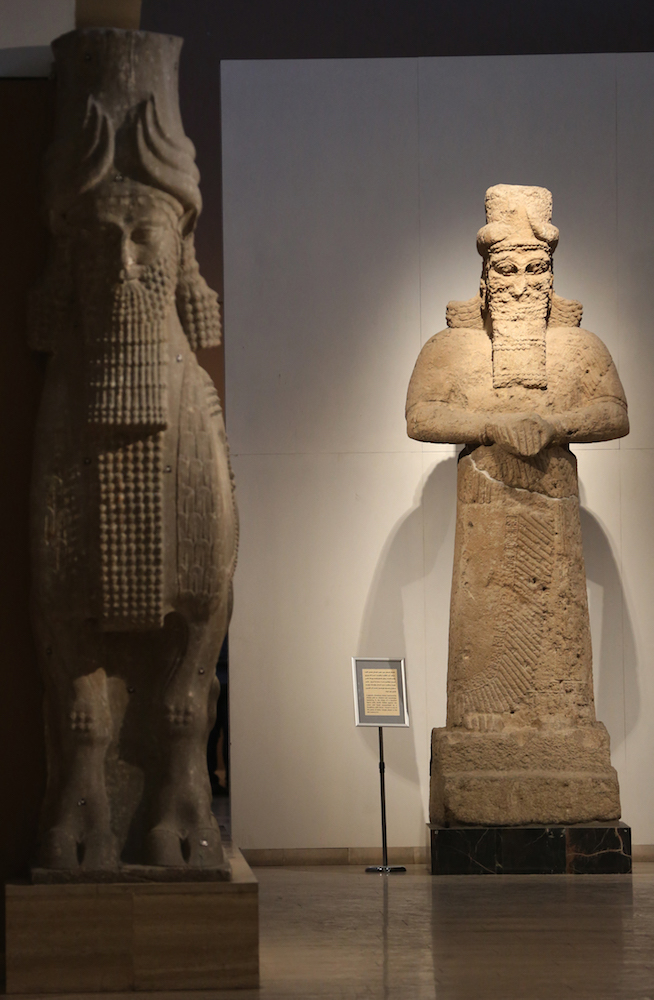
Assyrian artefacts originally from Mosul are displayed at Iraq's National Museum in Baghdad. (AFP/File Photo)
“Foreign workers and tourists face challenges and difficulties in terms of security and administration. We need to provide facilities and help them when they are coming to Iraq.
“We have the capabilities to make discoveries at archaeological sites but it requires funds and support to do that. It is the government’s responsibility to fund and support local students and researchers.”
Indeed, as Iraq begins to emerge from decades of crisis, experts believe an opportunity has presented itself to develop other aspects of its economy besides oil to embrace educational partnerships and perhaps even international tourism.
“Antiquities and tourism are one the biggest economic aspects that Iraq should focus on, as it mainly depends on oil, which can fall at any time in the future,” said Abdul-Razzaq. “If we wisely focus on antiquities and tourism, it will play a significant role.
“For example, we in Dhi Qar used to have one or maybe two tourists per month. Now we have three to four tourists per day coming to Dhi Qar. Iraq’s tourism sector can play a bigger role than oil.”
Abdul-Razzaq hopes that in the process, Iraqis will not only begin to feel proud of their history and shared identity but also turn the page on the violence and sectarian strife of recent decades.
“We have to take advantage of our ancient archaeology and history,” he said. “We are known as the cradle of human civilization and humanity. Everything began in Iraq: The first laws, writing, medicines and agriculture.
“I always focus on archaeological development because it will create national identity. We are just like a tree — we have very strong roots.”


